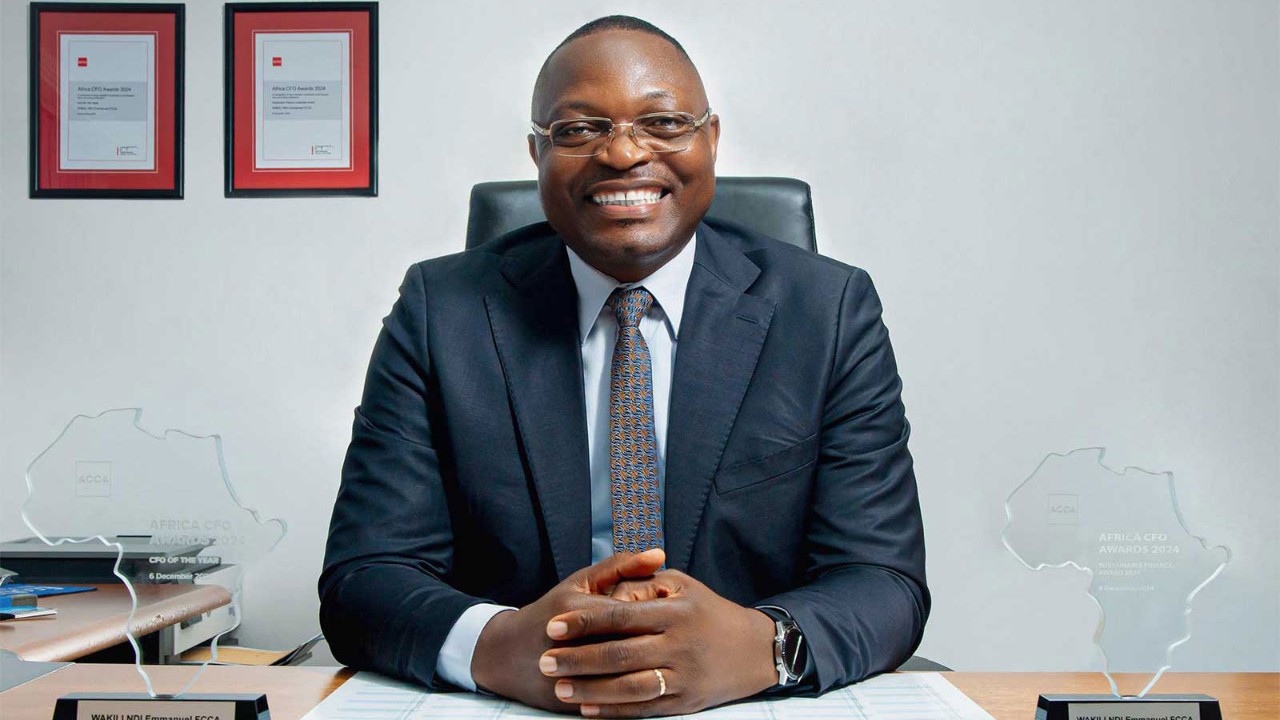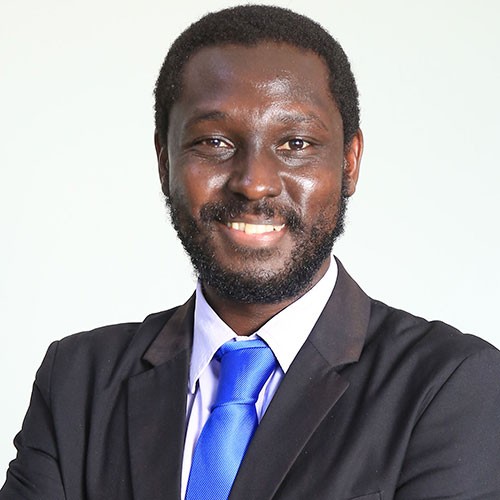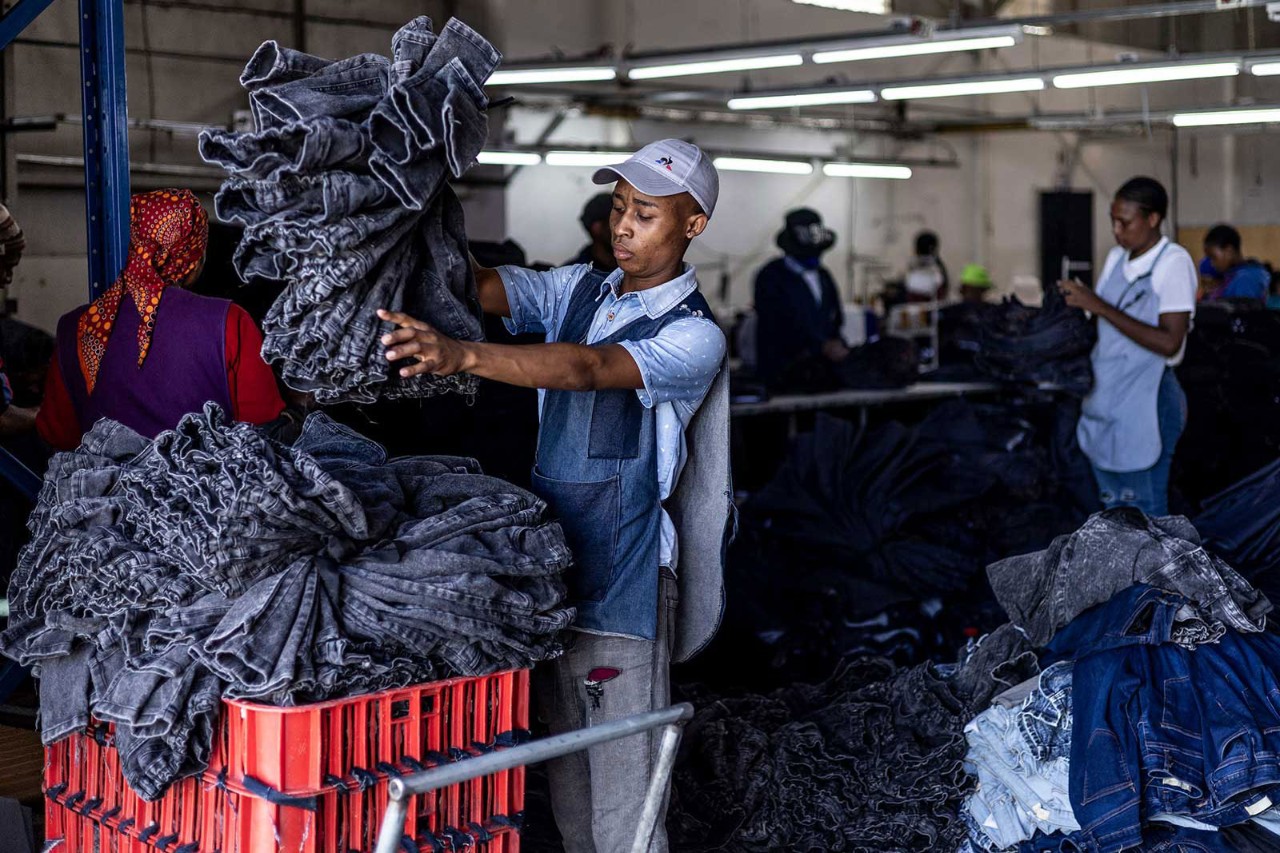
The day in 2003 when Emmanuel Wakili FCCA heard he had passed his final ACCA exams is, he says, not one that he will ever forget. ‘I had to go to an internet café to read my emails,’ he says. ‘A lot of junior students were also there to get their results – and when they saw that I had passed, everyone joined in the celebrations.’
As the first student to study and complete ACCA’s exams in his native Cameroon, Wakili began his career as a trailblazer – and continues to demonstrate to young Cameroonians the value of the ACCA qualification. ‘When I first started studying, I remember the ACCA slogan at the time: ACCA will take you places, and not just to work and back,’ he says. ‘I was determined to show people in Cameroon that that was true.’
Award-winning work
After more than 21 years in the banking sector, Wakili is now executive director and CFO of Ecobank Cameroon, and regional CFO for CEMAC and Central Eastern and Southern Africa (CESA) at the high-profile pan-African bank. Ecobank launched in 1985 with a mission to contribute to the economic development and financial integration of Africa by meeting the needs of African entrepreneurs. Last year, Wakili was named as ACCA’s Africa CFO of the Year, as well as receiving the Sustainable Finance Leadership Award.
‘I always paid attention to the rules of the game and that made me stand out’
Ecobank Transnational has banking operations in 33 countries across Africa, as well as an affiliate in France and offices in China, Dubai, Ethiopia, South Africa and the UK. Overall, the bank employs more than 13,000 people and serves around 32 million retail, commercial and corporate customers. Wakili is responsible for managing the finance function of 18 of the countries where the bank operates, as well as ensuring a strategic finance oversight of its asset and investment and microfinance businesses.
It is a remarkable achievement for a man from what he describes as ‘a humble background’. He was the first member of his family to attend university and credits the British Council and the Commonwealth representative at the University of Buea for their support in providing a platform to study for the ACCA qualification in Cameroon.
‘At the time, if you wanted to become an ACCA you had to go to the UK to study, but the university’s collaboration with the Commonwealth meant it was able to launch an ACCA programme right there in Buea,’ he says. Financially, finding the necessary fees meant it was a risk for Wakili and the five other students who enrolled on this inaugural programme – he was the only one to make it to the finish line, sitting the exams as a lone candidate, but his hard work has more than paid off.
CV
2020–present
Executive director and CFO, Cameroon, CEMAC and CESA, Ecobank
2016
CFO, Cameroon, also regional CFO, CEMAC cluster (2017–) and CESA (2018–), Ecobank
2012
Senior finance officer, performance management, and later head of strategy, Ecobank Cameroon
2011
CFO, NFC Bank
2003
Assistant internal auditor, later chief accountant and deputy CFO, Union Bank of Cameroon
Audit beginnings
Once qualified, Wakili was recruited as an assistant internal auditor with the Union Bank of Cameroon, a commercial bank set up in 1999 and licensed by the Bank of Central African States (BEAC), after his very first interview.
Within a couple of years, he was asked to set up a control department, tasked with reconciling millions of dollars held in internal accounts. It was a tumultuous time for the bank, leading to it entering provisional administration and eventually, in 2014, the Cameroon government taking a 98% stake in order to keep it afloat.
‘ACCA’s ethical values have always been very important in my career,’ Wakili says. ‘I always paid attention to ethical practices and the rules of the game and that made me stand out.’
‘I want to build sustainable growth and see sustainable performance’

After the administrator was appointed, Wakili was moved to head office as chief accountant and deputy CFO, and became part of a four-person management team tasked with forming a restructuring plan under the supervision of the regulator. In his capacity as board secretary, Wakili was asked to present the restructuring plan to the central bank, in the presence of his fellow board members. ‘That really built my confidence,’ he says.
He has four clear priorities in his work as CFO at Ecobank, which he joined in 2012: sustainability, compliance, trust and efficiency. ‘Some of our markets are performing well and others less so,’ he says of the first in that list. ‘As chief value officer, I want to work hand in glove with my regional managing director to build sustainable growth and see sustainable performance across all our markets.’
Evolving sector
The rapidly evolving African banking sector means that compliance and risk management is a constantly moving target. ‘We have to be continuously innovating, changing our processes and procedures to ensure we are not just compliant at all times but that we build a compliance culture.’
This is just one element that is essential to building trust with stakeholders, he believes. ‘It’s important that we have integrity, that the numbers we report are ethically sound, so you can build trust in the figures you report to the market.’
The final priority is ensuring that his region and franchise performs effectively in a highly competitive market. ‘Western companies increasingly tend to exit Africa because of a lack of efficiency and lower profitability,’ he says. ‘I’m constantly looking at ways of streamlining expenses without compromising growth, focusing spending in the right way, and using technology and data analytics to employ resources more efficiently.’
‘The large unbanked population is an opportunity for us’
Challenges and opportunities
As competition grows from fintechs, the challenges for all banks worldwide is top of Wakili’s mind. But Africa also has other concerns. ‘The first challenge for me is financial inclusion; we still have a large unbanked population, and that is an opportunity for us. But we are also facing socio-political instability in most of our markets, which means unstable governance systems.’
Crossborder banking, he adds, is a significant opportunity for African banks if challenges can be addressed. ‘The cost of a flight from Cameroon to London is lower than from Cameroon to most African countries, and the cost of visas within Africa remains relatively high. That’s a big challenge for African markets.’
Sustainability policies could open doors, he says. ‘In Africa, we have only limited access to long-term capital investment for things like technology and infrastructure, so our internet penetration is very low, for example, and the internet is very unstable, which impacts our move to digital. That’s why sustainability in finance is critical.
‘It helps with risk management, but it also feeds into long-term profitability,’ he says, adding that companies want to work with banks that have good policies around environmental, social and governance (ESG). ‘Strong reporting and clear disclosures around ESG in annual reports and financial statements help institutions attract affordable funding.’ This, for Wakili, shows the essential role that professional accountants across Africa play in creating a competitive financial sector.


